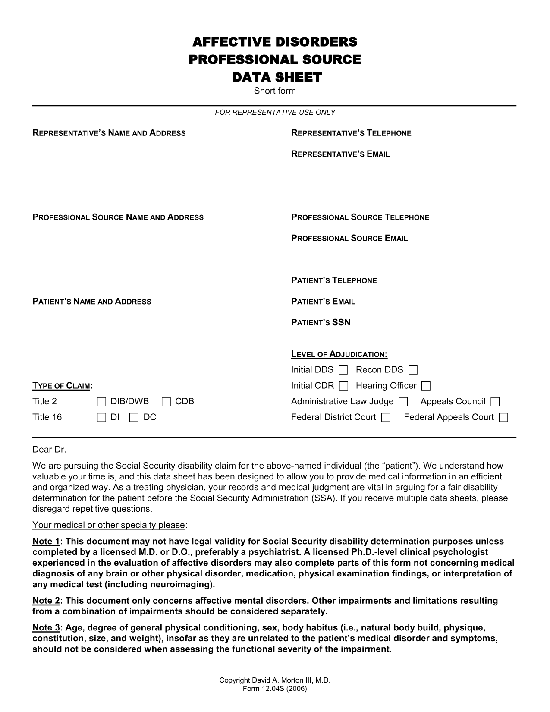Can I Get Social Security Disability Benefits for Depression, Bipolar Disorder, or Mania?
- How Does the Social Security Administration Decide if I Qualify for Disability Benefits for Bipolar Disorder, Depression, or Mania?
- About Affective Disorders and Disability
- Winning Social Security Disability Benefits for Depression, Mania, or Bipolar Disorder by Meeting a Listing
- Residual Functional Capacity Assessment for Depression, Mania, and Bipolar Disorder
- Getting Your Doctor’s Medical Opinion About What You Can Still Do
Residual Functional Capacity Assessment for Depression, Mania, and Bipolar Disorder
What Is RFC?
When an affective disorder is not severe enough to meet or equal a listing at Step 3 of the Sequential Evaluation Process, the Social Security Administration will need to determine residual functional capacity (RFC) to decide whether the claimant is disabled at Step 4 and Step 5 of the Sequential Evaluation Process. RFC is a claimant’s ability to perform work-related activities. In other words, it is what you can still do despite your limitations. The lower the RFC, the less the Social Security Administration believes the claimant can do.
Mental RFC
An RFC for mental impairments is expressed in terms of whether Social Security Administration believes the claimant can do skilled, semi-skilled, or unskilled work in spite of impairments, or whether the claimant cannot even do unskilled work.
Denial Likely for RFCs for Unskilled Work or Better
Claimants with a mental RFC for the ability to perform unskilled work who have no physical impairments will almost always be denied Social Security disability benefits. Rare exceptions are claimants with no more than a limited education, who are close to retirement age, and who have a lifelong history of unskilled work that they can no longer perform. Large numbers of claimants are denied with mental RFCs for unskilled work because the Social Security Administration can cite many jobs that require only unskilled work.
Claimants with bipolar disorder and major depression that does not meet the listing can often function well enough under appropriate therapy to perform at least unskilled work. But there are exceptions and all claimants with these diagnoses deserve very careful and full evaluation of their claims to detect those exceptions.
Bipolar disorder, even when stabilized with lithium, is often accompanied by cognitive dysfunction. For example, reasoning, verbal learning, planning, and memory are likely to be affected so these claimants may require an RFC for less than skilled work. The cognitive abnormalities may not be obvious on casual interaction, but can show up on neuropsychological examination as with the Halstead-Reitan test.
Mental and Physical Impairments Together May Qualify
Many claimants have both physical and mental impairments. The claimant may be found disabled when the effect of both impairments is considered, even though the physical impairment alone or the mental impairment alone would not be sufficient.
Inability to Perform Even Unskilled Work Should Result in Allowance
A marked impairment in any of the abilities required for unskilled work will result in allowance of a claim even in the absence of any physical impairment. These basic mental demands are:
- Remember work-like procedures (locations are not critical).
- Understand and remember very short and simple instructions.
- Carry out very short and simple instructions.
- Maintain attention for extended periods of 2-hour segments (concentration is not critical).
- Maintain regular attendance and be punctual within customary tolerances. (These tolerances are usually strict.) Maintaining a schedule is not critical.
- Sustain an ordinary routine without special supervision.
- Work in coordination with or proximity to others without being (unduly) distracted by them.
- Make simple work-related decisions.
- Complete a normal workday and workweek without interruptions from psychologically based symptoms and perform at a consistent pace without an unreasonable number and length of rest periods. (These requirements are usually strict.)
- Ask simple questions or request assistance.
- Accept instructions and respond appropriately to criticism from supervisors.
- Get along with coworkers or peers without (unduly) distracting them or exhibiting behavioral extremes.
- Respond appropriately to changes in a (routine) work setting.
- Be aware of normal hazards and take appropriate precautions.
The Social Security Administration requires a lot of information to assess whether a claimant has these abilities. This is an important area in which the Social Security Administration may not develop the case very well. Information from family members about how the claimant behaves at home and in social situations can help. This information can be extrapolated to a work setting. Specific work-setting information can sometimes be obtained from former supervisors or co-workers. Treating physicians may have made observations or have opinions regarding the claimant’s ability to perform these basic capacities.
Getting Your Doctor’s Medical Opinion About What You Can Still Do
Your Doctor’s Medical Opinion Can Help You Qualify for Social Security Disability Benefits
The Social Security Administration’s job is to determine if you are disabled, a legal conclusion based on your age, education and work experience and medical evidence. Your doctor’s role is to provide the Social Security Administration with information concerning the degree of your medical impairment. Your doctor’s description of your capacity for work is called a medical source statement and the Social Security Administration’s conclusion about your work capacity is called a residual functional capacity assessment. Residual functional capacity is what you can still do despite your limitations. The Social Security Administration asks that medical source statements include a statement about what you can still do despite your impairments.
The Social Security Administration must consider your treating doctor’s opinion and, under appropriate circumstances, give it controlling weight.
The Social Security Administration evaluates the weight to be given your doctor’s opinion by considering:
- The nature and extent of the treatment relationship between you and your doctor.
- How well your doctor knows you.
- The number of times your doctor has seen you.
- Whether your doctor has obtained a detailed picture over time of your impairment.
- Your doctor’s specialization.
- The kinds and extent of examinations and testing performed by or ordered by your doctor.
- The quality of your doctor’s explanation of your impairment.
- The degree to which your doctor’s opinion is supported by relevant evidence, particularly medically acceptable clinical and laboratory diagnostic techniques.
- How consistent your doctor’s opinion is with other evidence.
When to Ask Your Doctor for an Opinion
If your application for Social Security disability benefits has been denied and you have appealed, you should get a medical source statement (your doctor’s opinion about what you can still do) from your doctor to use as evidence at the hearing.
When is the best time to request an opinion from your doctor? Many disability attorneys wait until they have reviewed the file and the hearing is scheduled before requesting an opinion from the treating doctor. This has two advantages.
- First, by waiting until your attorney has fully reviewed the file, he or she will be able to refine the theory of why you cannot work and will be better able to seek support for this theory from the treating doctor.
- Second, the report will be fresh at the time of the hearing.
But this approach also has some disadvantages.
- When there is a long time between the time your attorney first sees you and the time of the hearing, a lot of things can happen. You can improve and go back to work. Your lawyer can still seek evidence that you were disabled for a certain length of time. But then your lawyer will be asking the doctor to describe your ability to work at some time in the past, something that not all doctors are good at.
- You might change doctors, or worse yet, stop seeing doctors altogether because your medical insurance has run out. When your attorney writes to a doctor who has not seen you recently, your attorney runs the risk that the doctor will be reluctant to complete the form. Doctors seem much more willing to provide opinions about current patients than about patients whom they have not seen for a long time.
Here is an alternative. Suggest that your attorney request your doctor to complete a medical opinion form on the day you retain your attorney. This will provide a snapshot description of your residual functional capacity (RFC) early in the case. If you improve and return to work, the description of your RFC provides a basis for showing that you were disabled for a specific period. If you change doctors, your attorney can get an opinion from the new doctor, too. If you stop seeing doctors, at least your attorney has one treating doctor opinion and can present your testimony at the hearing to establish that you have not improved.
If you continue seeing the doctor but it has been a long time since the doctor’s opinion was obtained, just before the hearing your attorney can send the doctor a copy of the form completed earlier, along with a blank form and a cover letter asking the doctor to complete a new form if your condition has changed significantly. If not, your attorney can ask the doctor to send a one-line letter that says there have been no significant changes since the date the earlier form was completed.
There are times, though, that your attorney needs to consider not requesting a report early in the case.
- First, depending on the impairment, if you have not been disabled for twelve months, it is usually better that your attorney wait until the twelve-month duration requirement is met.
- Second, if you just began seeing a new doctor, it is usually best to wait until the doctor is more familiar with your condition before requesting an opinion.
- Third, if there are competing diagnoses or other diagnostic uncertainties, it is usually best that your attorney wait until the medical issues are resolved before requesting an opinion.
- Fourth, a really difficult judgment is involved if your medical history has many ups and downs, e.g., several acute phases, perhaps including hospitalizations, followed by significant improvement. Your attorney needs to request an opinion at a time when the treating doctor will have the best longitudinal perspective on your impairment.
Medical Opinion Forms
Medical opinion forms can be great time savers for both your attorney and your doctor, but they must be used with care. Forms may not be appropriate at all in complex cases; and they need to be supplemented in many cases so that all issues are addressed. The best forms are clear and complete but not too long.
When the time is right, here is a form for your disability attorney to use:
Continue to the full version of the Affective Disorders Professional Source Data Sheet.
Go back to Winning Social Security Disability Benefits for Depression, Mania, or Bipolar Disorder by Meeting a Listing.

